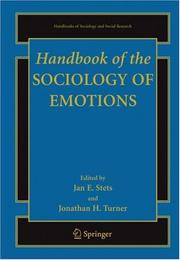| Listing 1 - 10 of 18 | << page >> |
Sort by
|

ISBN: 0387966285 1461387604 Year: 1988 Publisher: New York Springer
Abstract | Keywords | Export | Availability | Bookmark
 Loading...
Loading...Choose an application
- Reference Manager
- EndNote
- RefWorks (Direct export to RefWorks)
Sociology of the family. Sociology of sexuality --- Psychiatry --- Social problems --- Marital violence --- Wife abuse --- Psychological aspects. --- Prevention. --- Domestic violence
Book
ISBN: 9401791309 9401791295 1322175519 Year: 2014 Publisher: Dordrecht : Springer Netherlands : Imprint: Springer,
Abstract | Keywords | Export | Availability | Bookmark
 Loading...
Loading...Choose an application
- Reference Manager
- EndNote
- RefWorks (Direct export to RefWorks)
Handbook of the Sociology of Emotions Volume II presents all new chapters in the ever developing area of the sociology of emotions. The volume is divided into two sections: Theoretical Perspectives and Social Arenas of Emotions. It reviews major sociological theories on emotions, which include evolutionary theory, identity theory, affect control theory, social exchange theory, ritual theory, and cultural theory among others. Social arenas where emotions are examined include, but are not limited to, the economy and the workplace, the family, mental health, crime, sports, technology, social movements, and the field of science. All the chapters review the major theories and research in the area, and each chapter ends with some discussion of directions for future research. The Sociology of Emotions is a fast growing and vital field in the broad discipline of Sociology. This volume II follows the Handbook of the Sociology of Emotions which was first published in 2006. In 2008, this first handbook received the “Outstanding Recent Contribution” in the Emotions Section of the American Sociological Association. With contributions from leading scholars from different areas in the discipline, such as neurosociology, culture, economics, mental health, gender, social movements, discussing state-of-art theory and research on emotions in sociology this volume will generate wider appeal to the sociological community.
Emotions --- Social psychology --- Sociological aspects --- Mass psychology --- Psychology, Social --- Human ecology --- Psychology --- Social groups --- Sociology --- Feelings --- Human emotions --- Passions --- Affect (Psychology) --- Affective neuroscience --- Apathy --- Pathognomy --- Consciousness. --- Sociology, general. --- Personality and Social Psychology. --- Apperception --- Mind and body --- Perception --- Philosophy --- Spirit --- Self --- Sociology. --- Personality. --- Social psychology. --- Personal identity --- Personality psychology --- Personality theory --- Personality traits --- Personology --- Traits, Personality --- Individuality --- Persons --- Temperament --- Social theory --- Social sciences
Book
ISBN: 9780195388275 0195388275 9780195388282 0195388283 1282270656 9786612270659 019973674X 0199943931 0199889112 Year: 2009 Publisher: Oxford Oxford university press
Abstract | Keywords | Export | Availability | Bookmark
 Loading...
Loading...Choose an application
- Reference Manager
- EndNote
- RefWorks (Direct export to RefWorks)
All people derive particular identities from their roles in society, the groups they belong to, and their personal characteristics. Introduced almost thirty years ago, identity theory is a social psychological theory in the field of sociology that attempts to understand identities, their sources in interaction and society, their processes of operation, and their consequences for interaction and society. The theory brings together in a single framework the central roles of both meaning and resources in human interaction and purpose. This book describes identity theory, its origins, the research
Identity (Psychology) --- Identité (Psychologie) --- 316.37 --- 316.63 --- 316.63 Sociaal bewustzijn. Zelfconcept --- Sociaal bewustzijn. Zelfconcept --- 316.37 Identiteit. Individu en maatschappij. Persoonlijkheid --- Identiteit. Individu en maatschappij. Persoonlijkheid --- Identity (Psychology). --- Identité (Psychologie) --- Personal identity --- Personality --- Self --- Ego (Psychology) --- Individuality --- Psychology.

ISBN: 0521847451 0521612225 9780521612227 9780521847452 9780511819612 1316046648 0511819617 Year: 2006 Publisher: Cambridge Cambridge University press
Abstract | Keywords | Export | Availability | Bookmark
 Loading...
Loading...Choose an application
- Reference Manager
- EndNote
- RefWorks (Direct export to RefWorks)
All social relations involve emotional responses, from the simplest face-to-face encounter through the mobilization of social movements to the commitments that individuals develop for culture and society. The social world is thus dependent upon the arousal of emotions, and equally significant conflict and change in societies is ultimately driven by emotional arousal. Thus, it is important to understand how human emotions influence, and are influenced by, the social world. This understanding takes us into the sociology of emotions that has emerged as a distinct area of inquiry over the last thirty years.
Emotions --- Social interaction --- Interpersonal relations --- Social psychology --- Interaction sociale --- Relations humaines --- Psychologie sociale --- Social aspects --- Aspect social --- #SBIB:309H505 --- 316.6 --- Mass psychology --- Psychology, Social --- Human ecology --- Psychology --- Social groups --- Sociology --- Human interaction --- Interaction, Social --- Symbolic interaction --- Exchange theory (Sociology) --- Human relations --- Interpersonal relationships --- Personal relations --- Relations, Interpersonal --- Relationships, Interpersonal --- Social behavior --- Object relations (Psychoanalysis) --- 316.6 Gedragstheorie. Sociaal gedrag. Sociale psychologie --(gedrag en zelfconcept van het individu in de groep z.o. {159.923.33}) --- Gedragstheorie. Sociaal gedrag. Sociale psychologie --(gedrag en zelfconcept van het individu in de groep z.o. {159.923.33}) --- Code en boodschap: psychologische, psycho-analytische benadering --- Health Sciences --- Psychiatry & Psychology --- Social interaction. --- Interpersonal relations. --- Social psychology. --- Social aspects.

ISBN: 9780387307138 9780387739915 0387307133 9780387307152 9786610800230 1280800232 038730715X Year: 2007 Publisher: New York : Springer,
Abstract | Keywords | Export | Availability | Bookmark
 Loading...
Loading...Choose an application
- Reference Manager
- EndNote
- RefWorks (Direct export to RefWorks)
Emotions --- Social psychology --- Sociological aspects --- Psychologie sociale --- Handbooks, manuals, etc. --- Aspect sociologique --- Guides, manuels, etc. --- Guides, manuels, etc --- EPUB-LIV-FT SPRINGER-B LIVSOCIA
Book
ISBN: 019087306X 9780190873066 Year: 2019 Publisher: New York, NY: Oxford university press,
Abstract | Keywords | Export | Availability | Bookmark
 Loading...
Loading...Choose an application
- Reference Manager
- EndNote
- RefWorks (Direct export to RefWorks)
Digital
ISBN: 9780387307152 Year: 2006 Publisher: Boston, MA Springer Science+Business Media, LLC
Abstract | Keywords | Export | Availability | Bookmark
 Loading...
Loading...Choose an application
- Reference Manager
- EndNote
- RefWorks (Direct export to RefWorks)
Social psychology --- Sociology --- sociologie --- emoties --- persoonlijkheidsleer
Digital
ISBN: 9789401791304 Year: 2014 Publisher: Dordrecht Springer Netherlands
Abstract | Keywords | Export | Availability | Bookmark
 Loading...
Loading...Choose an application
- Reference Manager
- EndNote
- RefWorks (Direct export to RefWorks)
Handbook of the Sociology of Emotions Volume II presents all new chapters in the ever developing area of the sociology of emotions. The volume is divided into two sections: Theoretical Perspectives and Social Arenas of Emotions. It reviews major sociological theories on emotions, which include evolutionary theory, identity theory, affect control theory, social exchange theory, ritual theory, and cultural theory among others. Social arenas where emotions are examined include, but are not limited to, the economy and the workplace, the family, mental health, crime, sports, technology, social movements, and the field of science. All the chapters review the major theories and research in the area, and each chapter ends with some discussion of directions for future research. The Sociology of Emotions is a fast growing and vital field in the broad discipline of Sociology. This volume II follows the Handbook of the Sociology of Emotions which was first published in 2006. In 2008, this first handbook received the “Outstanding Recent Contribution” in the Emotions Section of the American Sociological Association. With contributions from leading scholars from different areas in the discipline, such as neurosociology, culture, economics, mental health, gender, social movements, discussing state-of-art theory and research on emotions in sociology this volume will generate wider appeal to the sociological community.
Cognitive psychology --- Social sciences (general) --- Social psychology --- Sociology --- Personality development --- sociale psychologie --- sociologie --- sociale wetenschappen --- emoties --- bewustzijn --- persoonlijkheidsontwikkeling
Book
ISBN: 9780197529324 0197529321 9780197529317 9780197529348 9780197529355 Year: 2021 Publisher: New York Oxford University Press
Abstract | Keywords | Export | Availability | Bookmark
 Loading...
Loading...Choose an application
- Reference Manager
- EndNote
- RefWorks (Direct export to RefWorks)
"Born out of the view that social phenomena are best studied through the lens of different disciplinary perspectives, this book brings together leading scholars in the fields of sociology, developmental psychology, gerontology, political science, history, philosophy, and pastoral theology to study the growing number of individuals who no longer affiliate with a religion tradition. The scholars not only explore this phenomenon from their respective academic disciplines, but they also turn to each other's work to understand better the multi-faceted nature of non-affiliation today. The data gathered shows that it is best not to use the common expression "Nones" to describe non-affiliates because many of them still believe though they may not belong. The scholars explore the complex impact that non-affiliation has on individuals and the wider society, and what the future looks like for religion in America. Later in the book, there are insightful perspectives from professionals in the field who address how we might address non-affiliation, particularly among young adults. In general, this book provides a rich and thoughtful analysis on non-affiliation in American society from multiple scholarly perspectives. The increasing upward trend in non-affiliation threatens the vitality and long-term stability of religious institutions. Both the opening and closing pages of the book remind the reader that at the heart of religious affiliation is commitment and community, which may be the essence of maintaining these religious institutions"--
Non-church-affiliated people --- United States --- Church history
Digital
ISBN: 9780511819612 Year: 2005 Publisher: Cambridge Cambridge University Press
Abstract | Keywords | Export | Availability | Bookmark
 Loading...
Loading...Choose an application
- Reference Manager
- EndNote
- RefWorks (Direct export to RefWorks)
| Listing 1 - 10 of 18 | << page >> |
Sort by
|

 Search
Search Feedback
Feedback About UniCat
About UniCat  Help
Help News
News